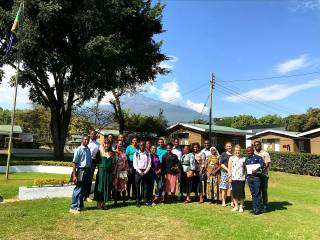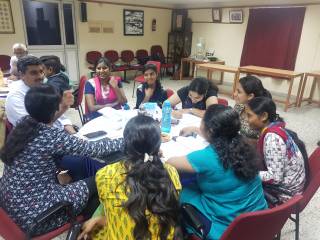
| Principal Investigator | Professor Aimee Spector |
| Co-Investigators | Professor Martin Orrell, |
| Other UCL team members | Dr Emma Beard, |
| Other UCL team members | Dr Charlotte R. Stoner, Professor Sarah Hawkes. |
| Key dates | 10th September 2018 – 9th September 2021 |
| Funder | United Kingdom Medical Research Council (MRC) Indian Council of Medical Research (ICMR). Supported by the Global Alliance for Chronic Diseases (GACD) |
| Project websites | Website: ucl.ac.uk/international-cognitive-stimulation-therapy |
Project aims

- to develop, test, refine and disseminate implementation strategies for CST for people with dementia in three diverse parts of the world,
- to create an ongoing and sustainable CST implementation programme which ultimately increases quality of life and cognition for people with dementia,
- to increase awareness and skills in the detection and management of dementia, both for health workers and families.
Project details
Methods
There are four overlapping phases of work: 1) an exploration of the barriers to and facilitators of CST in each country using a series of stakeholder meetings with policy/ decision makers, healthcare professionals, people with dementia and carers, 2) development of Implementation Plans for each country to address findings from Phase 1, 3) evaluation of implementation strategies using a study of CST in each country (n = 50, total n = 150) and, 4) refinement and dissemination of implementation plans.
Current results
Phase 1 stakeholder meetings have now been run in all three countries. A number of unique and shared barriers to and facilitators of CST implementation were identified in each country, for example, long travel times for a short session time affected acceptability of the intervention in Tanzania and the need for protected time for newly trained CST facilitators was identified in Brazil, India and Tanzania. As part of Phase 2, The Tanzania Implementation Plan was developed and rolled out in April 2019. Included in this plan are a wide range of implementation activities that will be used, including engaging with higher education institutions to incorporate CST for relevant taught programmes. The team have also recruited and delivered CST to 53 people with dementia in Arusha. Having run most of their stakeholder meetings, the teams in Brazil are currently developing their Implementation Plan, which will include sections on both the private and public healthcare systems. In India, the teams are compiling all of their barriers and facilitators as part of Phase 2 and will develop their Implementation Plans based on these. Both the Brazil and India teams plan to start delivering CST as part of Phase 3 in autumn 2019.
Next steps

Over the next year, all teams will aim to have recruited 50 people with dementia for each site and delivered a complete programme of CST. The analysis of this data will inform how successful the developed implementation strategies have been.
Key publications
Spector A, Stoner CR, Chandra M, et al. Mixed methods implementation research of cognitive stimulation therapy (CST) for dementia in low and middle-income countries: study protocol for Brazil, India and Tanzania (CST-International) BMJ Open 2019;9:e030933. doi: 10.1136/bmjopen-2019-030933.
 Close
Close

